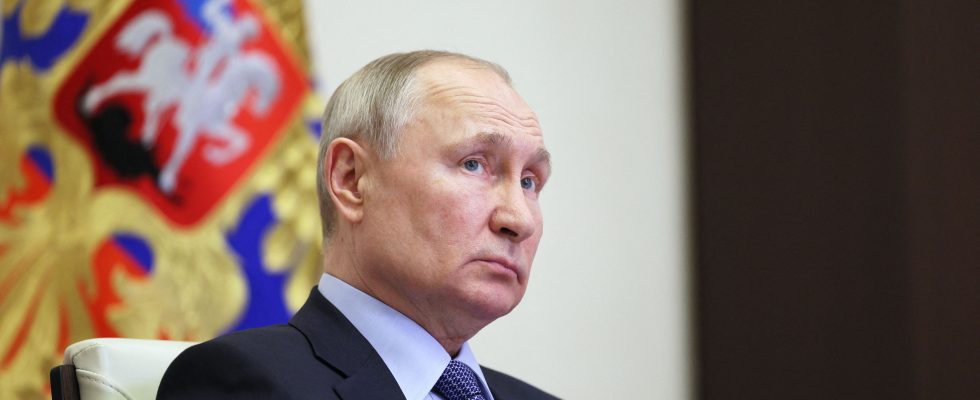The Kremlin has not played its last card. Russia would conduct an influence operation in Germany to try to form an anti-war coalition, reports the American daily the washington post in a survey published April 21. Moscow would thus bet on the emergence of a peaceful coalition, marrying far right and far left Germans, to push for the cessation of arms deliveries to Ukraine, according to a mine of Russian documents examined by the media. Last March, 18 Leopard heavy combat tanks and around 40 Marder combat vehicles were delivered by Berlin to the Ukrainian army.
To illustrate the rapprochement between the two German political extremities, the article takes the example of a rally which took place on February 25, led by Sahra Wagenknecht, deputy of the German extreme left party Die Linke. At 53, this politician has been talked about for her calls for an end to arms deliveries to Ukraine, but also for her desire to found a new political formation before the European elections of 2024. “A party responsible for bringing together voters who no longer feel heard”, according to the German magazine Der Spiegel, who decided to put it on the cover on April 14. Opinion polls show the growing popularity of this 50-year-old.
Also present at this demonstration was Jürgen Elsässer, editor-in-chief of the far-right magazine Compact. Dozens of members of the far-right Alternative für Deutschland (AfD) party applauded Sahra Wagenknecht’s calls. AfD echoes Kremlin’s rhetoric that the war in Ukraine was started by the United States and that Russia is defending itself from NATO encirclement while protecting Russian speakers in eastern Ukraine .
In Germany, the AfD’s popularity rate reached 15% at the national level at the beginning of February, according to an article in the German daily Tagesspiegel. If the AfD decided to ally with Sahra Wagenknecht, they could form a significant opposition force in the country. For his part, Petr Bystron, the AfD’s foreign policy spokesman, insisted that such an alliance happened naturally and had nothing to do with the Kremlin’s plans.
Undermining Western Unity
In the meantime, Moscow keeps its eyes on public opinion German. The mobilization of February 25 had gathered 13,000 people, near Brandenburger Tor, according to police data. Organizers disputed that official figure, however, saying 50,000 people attended. In the wake of this demonstration, an online petition opposing the delivery of additional weapons to Ukraine had received the support of more than 700,000 signatures.
The idea of uniting the extremes of Germany is said to have emerged among senior Muscovite officials. THE washington post relies on a series of Russian and European documents to conduct its investigation. From these, the American media concludes that the Kremlin has decided to focus on Germany to strengthen anti-war sentiment in Europe and cut kyiv off from any support. While the evidence does not contain audios featuring communications between Russian strategies and German politicians, interviews “show that at least one person close to Wagenknecht and several members of the AfD were in contact with Russian officials at the time. developing plans,” he said.
The journalists of washington post add that these documents “show for the first time the direct attempts of the Kremlin to intervene in German politics by seeking to forge a new coalition between Wagenknecht, the far left and the AfD, as well as to support the protests of extremists left and right against the German government”. Through the Russian plan for a German coalition for peace, the Kremlin once again shows its attempt to undermine Western unity in the face of the conflict in Ukraine. THE washington post recalls that the strategy of exploiting peace demonstrations in order to divide the West is not new: it has already been used during the Soviet era. “We know [ces tactiques] of the Cold War, when the Soviets tried to influence and manipulate anti-war movements,” said a senior German security official, who spoke to the washington post on condition of anonymity.
Finally, other records indicate that on July 13, the Kremlin’s first Deputy Chief of Staff, Sergei Kiriyenko, assembled a group of Russian political strategists and told them that Germany would become “the center” of the Moscow’s efforts to undermine support for Ukraine in Europe. At the end of last August, according to the documents gathered by the Washington Post, Russian strategists were compiling information on planned protests across Germany, from Neustrelitz, a small town north of Berlin, to Stuttgart in the west. They were to take place under the direction of the extreme left or the extreme right, including mobilizations led by the very heterogeneous Reichsbürger movement. Still according to the daily, some of these demonstrations could have been initiated by men from the Kremlin.
